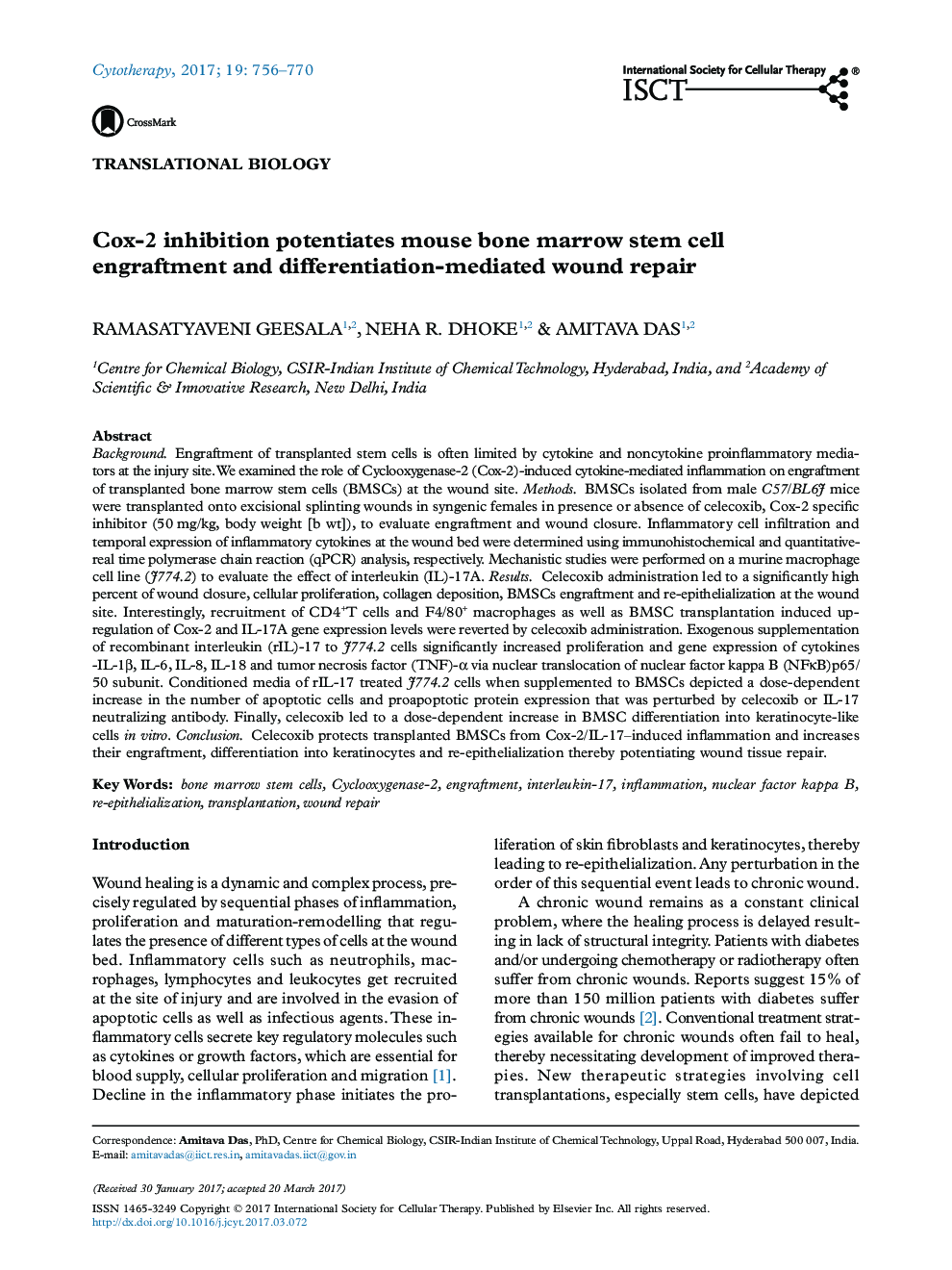| کد مقاله | کد نشریه | سال انتشار | مقاله انگلیسی | نسخه تمام متن |
|---|---|---|---|---|
| 5531413 | 1401795 | 2017 | 15 صفحه PDF | دانلود رایگان |
- Cox-2 inhibitor administration enhanced BMSC transplantation-mediated wound tissue repair by increasing engraftment and re-epithelialization.
- Cox-2 inhibition significantly decreased IL-17A expression at wound site indicating it as a downstream modulator of Cox-2.
- IL-17-ediated activation of macrophages-increased proliferation and proinflammatory cytokine expression involves NFκB signaling.
- Cox-2 inhibitor, celecoxib protects BMSCs from apoptosis caused by the activated macrophages and also promotes differentiation into keratinocyte-like cells.
BackgroundEngraftment of transplanted stem cells is often limited by cytokine and noncytokine proinflammatory mediators at the injury site. We examined the role of Cyclooxygenase-2 (Cox-2)-induced cytokine-mediated inflammation on engraftment of transplanted bone marrow stem cells (BMSCs) at the wound site.MethodsBMSCs isolated from male C57/BL6J mice were transplanted onto excisional splinting wounds in syngenic females in presence or absence of celecoxib, Cox-2 specific inhibitor (50âmg/kg, body weight [b wt]), to evaluate engraftment and wound closure. Inflammatory cell infiltration and temporal expression of inflammatory cytokines at the wound bed were determined using immunohistochemical and quantitative-real time polymerase chain reaction (qPCR) analysis, respectively. Mechanistic studies were performed on a murine macrophage cell line (J774.2) to evaluate the effect of interleukin (IL)-17A.ResultsCelecoxib administration led to a significantly high percent of wound closure, cellular proliferation, collagen deposition, BMSCs engraftment and re-epithelialization at the wound site. Interestingly, recruitment of CD4+T cells and F4/80+ macrophages as well as BMSC transplantation induced up-regulation of Cox-2 and IL-17A gene expression levels were reverted by celecoxib administration. Exogenous supplementation of recombinant interleukin (rIL)-17 to J774.2 cells significantly increased proliferation and gene expression of cytokines -IL-1β, IL-6, IL-8, IL-18 and tumor necrosis factor (TNF)-α via nuclear translocation of nuclear factor kappa B (NFκB)p65/50 subunit. Conditioned media of rIL-17 treated J774.2 cells when supplemented to BMSCs depicted a dose-dependent increase in the number of apoptotic cells and proapoptotic protein expression that was perturbed by celecoxib or IL-17 neutralizing antibody. Finally, celecoxib led to a dose-dependent increase in BMSC differentiation into keratinocyte-like cells in vitro.ConclusionCelecoxib protects transplanted BMSCs from Cox-2/IL-17-induced inflammation and increases their engraftment, differentiation into keratinocytes and re-epithelialization thereby potentiating wound tissue repair.
Journal: Cytotherapy - Volume 19, Issue 6, June 2017, Pages 756-770
